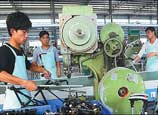
City's slowing economic figures reflect shift to make service sector a new priority, which starts to bear fruits
The economic transformation of Shanghai, China's business hub, is a major issue facing the world's second-largest economy, as members of the country's top legislature and political advisory body meet in early March.
Major economic indicators such as GDP growth and trade volumes outpaced central government targets in the Yangtze River Delta region in 2012, with the exception of Shanghai.
The city has long acted as a hub for the surrounding region, which ranks as the 10th-largest economy in the world.
But the easing of Shanghai's economic output, which grew 7.5 percent in 2012, compared with 8 percent for Zhejiang province and 10.1 percent for Jiangsu province, suggests its dwindling role in leading the regional economic powerhouse.
That argument won added impetus as the city posted a contraction in total trade for 2012 - for the first time in three years - with exports falling 1.4 percent year-on-year, according to data from the Shanghai Municipal Bureau of Statistics.
Under the surface, the economy is undergoing a "painful restructuring process", said Sun Lijian, a professor at the School of Economics at Fudan University in Shanghai.
"Shanghai's development has exhibited the typical pattern of China's shift from a manufacturing-based, export-led economy, to one driven by domestic consumption and the development of services and innovation."
Reading between the lines of the GDP figures, the services sector, including finance, property, tourism and telecommunications, expanded to 1.2 trillion yuan ($192.8 billion) in 2012, up 10.6 percent year-on-year, exceeding its regional peers.
The figure has, for the first time, claimed more than 60 percent of the total economic output, reflecting the increasing pace of the city's transformation into a value-added service-oriented economy, Sun said.
The city has undergone thorough changes following a rallying call to build itself into an international financial center by 2020, which has effectively propelled industrial companies to move to nearby cities and even interior provinces due to economic and environmental concerns.
Such determination was reflected in a speech given by then-mayor Han Zheng at the closing of the 2010 World Expo in Shanghai, recalled Robert Theleen, chairman of the American Chamber of Commerce in Shanghai.

















 China's 'leftover women' phenomenon arouses heated debate in West
China's 'leftover women' phenomenon arouses heated debate in West


![]()
